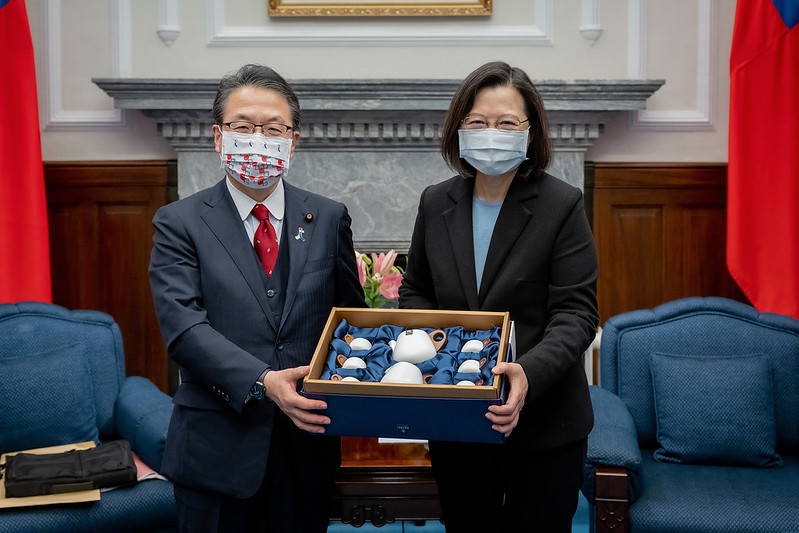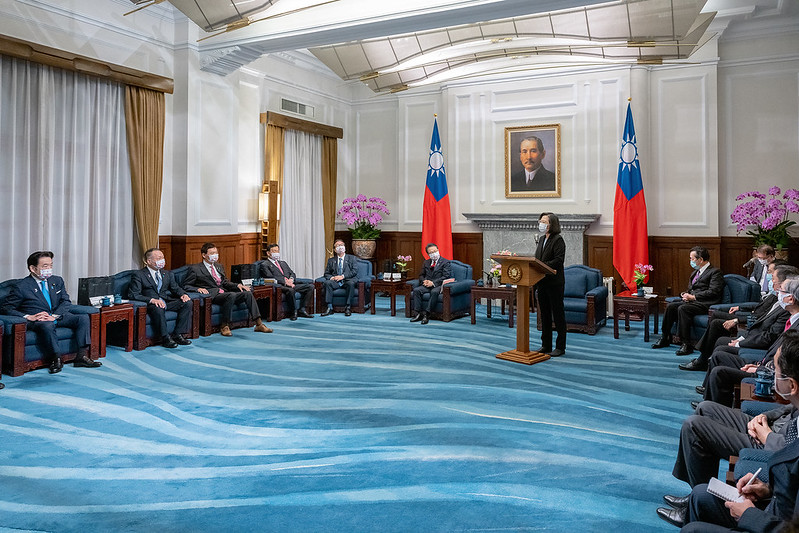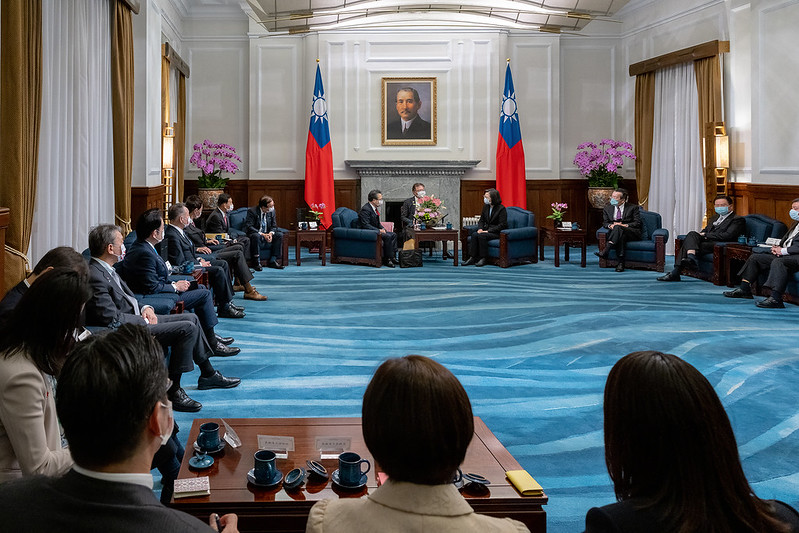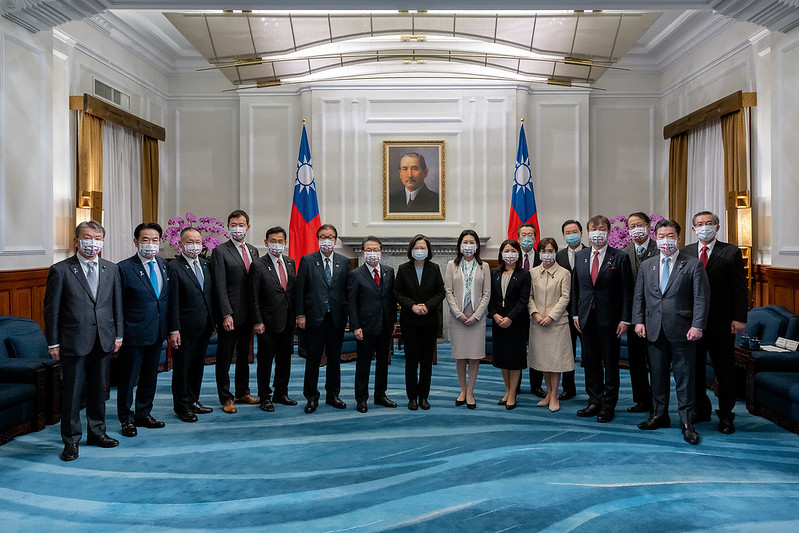News & activities
 News releases
News releases
On the morning of December 28, President Tsai Ing-wen met with a delegation led by member of Japan's House of Councillors Seko Hiroshige. In remarks, President Tsai said that Taiwan is working toward admission to the Comprehensive and Progressive Agreement for Trans-Pacific Partnership (CPTPP), and expressed hope that the Japanese Diet will lend us its strongest support in this effort, so that Taiwan, Japan, and other regional partners can work together to realize the vision of a free and open Indo-Pacific region. The president stated that Taiwan will continue to cooperate closely with Japan, the United States, members of the European Union, and other like-minded nations to maintain regional peace and stability, and to foster development and prosperity.
A translation of President Tsai's remarks follows:
I want to extend a warm welcome to House of Councillors member Seko and his delegation, and am very happy to once again see House of Councillors members Yamamoto Junzo and Horii Iwao. Your visit is yet another demonstration of the deep friendship between Taiwan and Japan. On behalf of the people of Taiwan, I want to express our most sincere welcome.
All of our visitors were firm partners of former Prime Minister Abe Shinzo, and have long been important friends and supporters of Taiwan. Throughout his life, former Prime Minister Abe worked to defend the values of democracy and freedom, and to advance Taiwan-Japan relations. People from all walks of life in Taiwan were deeply saddened at his passing.
We are very grateful to former Prime Minister Abe for his contributions to Taiwan-Japan relations, and I want to take this opportunity to thank the members of the Japanese Diet for valuing and supporting Taiwan. Your united efforts have brought about an even closer Taiwan-Japan partnership, and formed very strong bonds between us, or "kizuna," as you say in Japanese.
It has been two months since Taiwan loosened border restrictions, and two-way tourism between our countries is steadily recovering. Taiwan and Japan donated face masks and vaccines to each other, working together to get through the pandemic. I want to thank Japan again for helping Taiwan respond to the spread of COVID-19. I hope that our bilateral ties will not only continue to deepen in the tourism sector, but also in trade and security cooperation, so that together we can respond to the challenges of the post-pandemic world.
Taiwan is working toward admission to the CPTPP, and I hope that the members of the Japanese Diet will lend us their strongest support in this effort, so that Taiwan, Japan, and other regional partners can together strive toward the vision of a free and open Indo-Pacific.
Taiwan and Japan face shared regional challenges. Japan recently issued three key defense documents, which will substantially upgrade its defense capabilities and which demonstrate Japan's determination to maintain regional peace and stability.
Just yesterday we adopted the Military Force Realignment Plan, which restores a one-year period of mandatory military service and strengthens military training. Taiwan will continue to cooperate closely with Japan, the US, members of the European Union, and other like-minded nations to maintain regional peace and stability, and to foster development and prosperity.
In just a few days, a new year will begin. I thank our visitors once again, and welcome you all to come back often. In the new year, let's further our cooperation so that we can continue to enhance our bilateral friendship and achieve even greater results.
Mr. Seko then delivered remarks, expressing gratitude to President Tsai on behalf of the 12 visiting Liberal Democratic Party parliamentarians for meeting with them at such a busy time following her major policy announcement the previous day. Mr. Seko thanked Taiwan's government agencies for their hospitality, which helped make this a very productive visit for the delegation.
Mr. Seko also thanked Taiwanese from all walks of life who offered their heartfelt sympathy and condolences at the tragic passing of former Prime Minister Abe on July 8, as well as the high-level delegations that Taiwan sent to attend the former prime minister's family funeral, state funeral, and Yamaguchi prefectural funeral.
Mr. Seko stated that on the previous day, the delegation paid their respects at former President Lee Teng-hui's gravesite and laid flowers at former Prime Minister Abe's statue in Kaohsiung, fondly recalling the two great statesmen's dedication to promoting Taiwan-Japan relations. The delegation's 12 councillors also pledged to carry on those efforts.
Taiwan and Japan share universal values, Mr. Seko said, and as key partners and friends, always provide mutual assistance when facing a pandemic or natural disaster, working together to overcome adversity. The delegation members, he said, will do everything they can to deepen Taiwan-Japan relations going forward.
Mr. Seko noted that the previous day President Tsai announced a major national defense policy that reinstates mandatory one-year military service and strengthens Taiwan's national defense. He praised the policy and said that it signals Taiwan's determination to defend itself.
Mr. Seko mentioned that Japan recently published three defense-related documents including a National Security Strategy that promises to significantly increase the national defense budget and upgrade Japan's defense capabilities, and that the US also passed the National Defense Authorization Act. These documents, he said, send a clear message that the regional status quo cannot be changed by force or unilaterally, and that the relevant countries are upgrading their deterrence capabilities.
Mr. Seko expressed hope that a free and open Indo-Pacific, as expounded by former Prime Minister Abe, can be upheld, and that like-minded countries such as India and Australia will make a united effort to maintain peace and stability in this region.
Mr. Seko also mentioned that the delegation members are all well aware of Taiwan's enthusiasm and determination to join the CPTPP, a free trade agreement with high standards that requires compliance with stringent rules. Mr. Seko said he believes that Taiwan, which shares universal values with Japan, can definitely meet those requirements. He added that CPTPP regulations are fairly detailed, and that different countries have different vested interests. Japan is willing to play a part in helping adjust to these rules and the interests of different countries, Mr. Seko said, and hopes to provide Taiwan with relevant knowledge and experience.
Mr. Seko closed his remarks by once again thanking President Tsai and Taiwanese from all walks of life for their warm hospitality.
Also in attendance were Japanese House of Councillors members Yamamoto Junzo, Suematsu Shinsuke, Nakada Hiroshi, Yamada Hiroshi, Kitamura Tsuneo, Ohno Yasutada, Horii Iwao, Matsukawa Rui, Kada Hiroyuki, Ikuina Akiko, and Tomonoh Rio, and Japan-Taiwan Exchange Association Taipei Office Chief Representative Hiroyasu Izumi.












